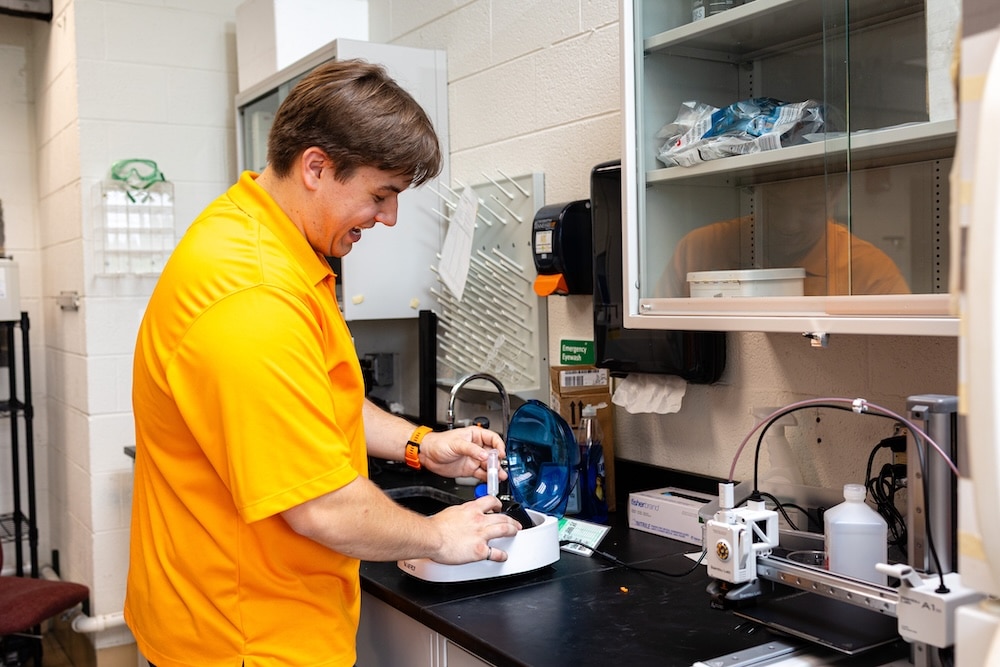David Dabkowski’s apartment isn’t the same as the average college student’s apartment. Alongside the couch, television and refrigerator, Dabkowski has a prosthetic hand that he created in his spare time.
Dabkowski collected some of his father’s old electronic equipment and found space in his apartment to set up a mini lab. He can connect an electromyography (EMG) sensor to his own skin and activate the prosthetic hand to move in symmetry.
“My big dream would be to work on exosuits,” said Dabkowski, a first-year master’s student in the Department of Biomedical Engineering at the University of Tennessee. “If people have had some sort of trauma and have trouble walking, being able to completely redevelop and give them back their capabilities would be so rewarding.”

Dabkowski grew up in nearby Sevier County with a dream of attending UT. His father was an electrical engineer, and Dabkowski spent his childhood taking apart electronics and tinkering. He competed in robotics and took an interest in blacksmithing and 3D printing as he got older.
When he enrolled at UT as an undergraduate student, Dabkowski was deciding between studying for a career in electrical engineering or plastic surgery. He discovered biomedical engineering was the perfect fit.
“It’s been great for letting me learn a lot about all the different disciplines. I feel like I’m kind of a jack of all trades for a lot of the classes I’ve taken,” Dabkowski said. “BME has allowed me to be able to take electrical courses, mechanical courses, biomaterials. It’s very diverse, which has been very fulfilling.”
Gaining Research Experience
Dabkowski pursued multiple research opportunities during his undergraduate studies in the Tickle College of Engineering. He’s worked under the guidance of Rigoberto Advincula, UT-ORNL Governor’s Chair of Advanced and Nanostructured Materials in the Department of Chemical and Biomolecular Engineering, and BME Associate Professor Dustin Crouch.
“Both Dr. Crouch and Dr. Advincula have been phenomenal mentors, and they’ve helped me not only understand more about research, but everything that goes on behind it,” Dabkowski said. “They’ve given me really good guidance and instilled in me a lot of interest in doing research and more hands-on work.”
Crouch has worked with Dabkowski on two projects—one on designing an artificial tendon graft to repair severe tendon injuries, and another on the design of a skin-covered, bone-anchored prosthetic thumb for amputees.

“David is an excellent student and researcher. He is very teachable, open and eager to learn new things,” Crouch said. “He has strong skills and aptitude for computational design and manufacturing, using both traditional machining and additive manufacturing. I think of him as being like an engineering ‘artist.’ He can quickly whip up a design and prototype for some new gadget we want to test. He’s very creative in that way.”
As a graduate student, Dabkowski will continue working with Crouch on the artificial tendon graft, specifically to design and test prototype version 2 of the device. He will also work on a project, in collaboration with Crouch’s colleagues at Georgia Tech, to develop and test a wearable exoskeleton for the upper extremity.
“David’s technical skills will be really valuable for these projects, and he will develop new skills in research design, project management, and academic writing that will help him in his career,” Crouch said. “I am excited to work with David in this new role as he works toward his master’s degree.”
Making a Home at UT
As part of his senior design project at UT, Dabkowski and his teammates worked on a prosthetic thumb prototype that had a bone anchor and a thump tip that can be connected with a screw. Throughout the process, he was able to interact with surgeons to gain their feedback about the device.
“It’s been really cool to meet with all these actual experts and learn what other features we should implement in our ongoing design,” Dabkowski said. “It’s helped me learn as well, not only their technical skills, but seeing how they carry themselves. Learning this real-world experience has been really beneficial.”

Dabkowski’s laptop computer is filled with photos and videos from his school-related and personal engineering projects. His curiosity and passion for innovation is obvious whenever he discusses his work. He recently purchased a used milling machine, which he set up in his parents’ basement, to start working on more complex projects.
Initially a bit reserved, Dabkowski has become more extroverted in college. The projects he’s worked on have pushed him to new places he may not have explored otherwise.
“Honestly, looking back now, I didn’t think I’d be as emotionally invested as I am in UT. But I definitely feel very at home here,” Dabkowski said. “I’ve been a part of clubs with people who have become like family. I’ve developed a great community that I am so grateful for at UT.”
Contact
Rhiannon Potkey ([email protected])

